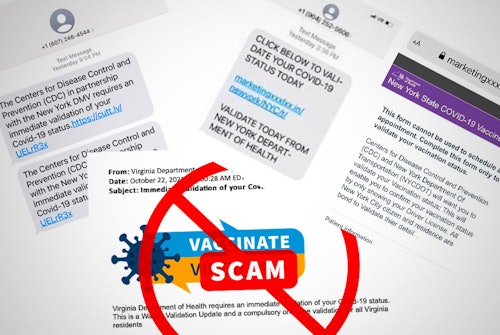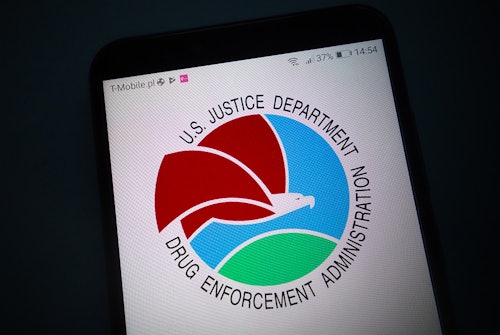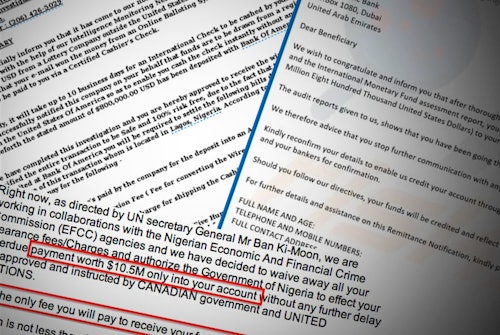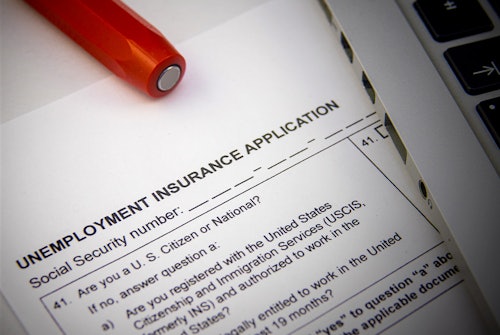Government Agencies In Depth
- What are Government Scams Involving Impersonators?
- Red Flags of Government Scams
- Common Government Scams Involving Imposters
- How to Beat Imposter Government Scams
- How to Recover from a Government Scam
According to the Internet Crime Complaint Center (IC3), over 12,000 people in the U.S. were victims of government impersonation scams in 2020 alone and lost more than $120 million in total. The best way to prevent yourself from falling victim to one of these government scams is by educating yourself about them.
What are Government Scams Involving Impersonators?
Government scams have the same purpose as any other scams. Scammers make up a story to steal your money, get access to your data, or steal your identity. In the case of these specific scams, the scammer will claim to be representing a government agency to add legitimacy and a level of fear to their claims.
For example, you could get a call from someone who says they work for the Social Security Administration. They could tell you that you are due extra benefits or that your Social Security number has been suspended. Then they will tell you that you must pay a fee to get those additional benefits or activate your Social Security number. After you pay, the scammer takes off with your money.
Alternatively, the scammer may tell you to click a link that takes you to a phishing website to add more details to your Social Security account and then use your details to steal your identity.
Red Flags of Government Scams
The best way to prevent yourself from falling victim to this type of scam is to know how these government agencies interact with the public. If the "government representative" you are talking to doesn't follow the same protocol, chances are you are dealing with a scammer. Here are some of the warning signs of a scam:
- The threat of legal action or imprisonment
- Demanding immediate money
- Threatening to confiscate your possessions
- Asking for payment via cash, gift card, prepaid debit card, cryptocurrency, or wire transfer
- Requiring a fee for a benefit you are supposedly due
- Claiming your Social Security number (SSN) will be suspended
- Misspellings and grammar errors in the message
- Asking for personally identifiable information
Common Government Scams Involving Imposters
Over half of imposter scams reported to the FTC are instigated by scammers masquerading as representatives of government agencies, and there is quite a variety of these scams. Here are some of the most common ones.
Social Security Scams
There is a wide variety of Social Security scams. For example, you could receive Social Security scam mail demanding you call a phone number where the scammer will ask you for sensitive information. Or you could receive a fake Social Security email that leads you to a phishing website.
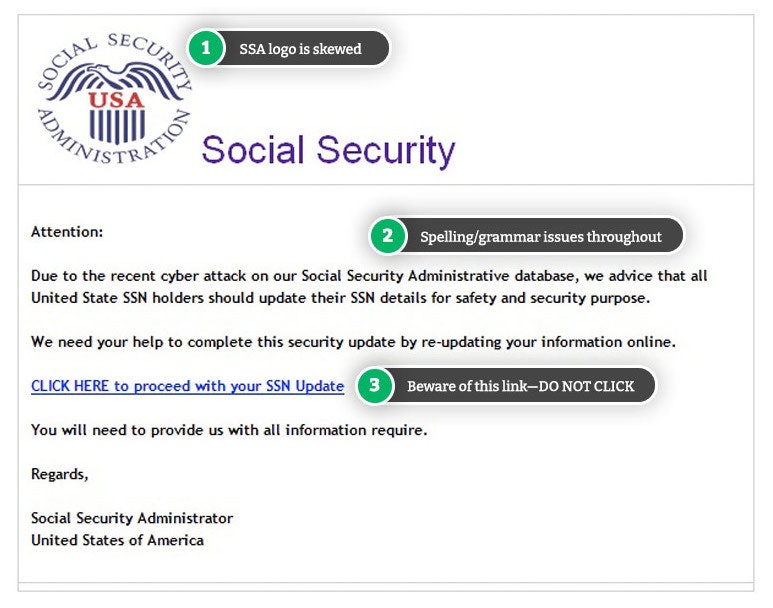
You could get a Social Security scam phone call where the scammer will ask for a payment or personally identifiable information. Or they could direct you to a Social Security phishing site to enter your Social Security number and other information they will use for identity theft.
Unemployment Scams
With this scam, you will receive a message from the scammer that states there is something wrong with your unemployment claim and ask you to click a link to correct your details. The link will go to a phishing site, and the scammer will use your information to steal your identity.
IRS Scams
In this type of scam, the scammer will send you an email, call you on the phone, or even send you a letter claiming to be from the IRS. The scammer will trick you into giving them your Social Security number or other sensitive data by having you click on a link to a phishing site or just ask you for the details over the phone. Once the scammer gets this information, they will use it to steal your identity.
DEA Impersonation Scams
The scammer will contact you and claim to be from the DEA in this scam. Then they will present you with "proof" that you ordered pills online without a prescription and demand that you pay a fine or you will be looking at felony charges.
FBI Impersonation Scams
In an FBI impersonation scam, the scammers may call you on the phone or contact you in person, claiming to be FBI agents. Once the scammer has you convinced, they will try to gain access to your house to steal items, claim that your Social Security number has been stolen to get you to transfer funds to a "special government account," and more.
How to Beat Imposter Government Scams
Beating a government impersonation scam requires you to be vigilant. First, be on the lookout for the red flags listed above. If you notice anything sketchy in the message you received, then use the following tips to avoid falling victim to the scam:
- Don't trust Caller ID because the number and name can be spoofed.
- Don't click on any links in the message.
- Don't send any money to the scammer.
- Don't call any phone number you are directed to call.
- Hang up on the phone call and block the phone number.
- Don't share sensitive information with the scammer.
- Don't enter any information other than on the official government site.
- If you are contacted in person, demand to see credentials and check them carefully.
- Call the government agency back on the legitimate phone number you find online.
How to Recover from a Government Scam
Depending on the type of government impersonation scam you fell victim to, some or all of the following steps will help you recover.
Report Government Scams
You want to start by reporting the scam to the authorities, including:
- The FBI Internet Crime Complaint Center
- The FTC
- Your state's Attorney General
- Your local police department
If the scammer contacted you via social media, you should also report it to the social media platform. If they contacted you via mail, you can report it to the U.S. Postal Inspection Service.
Contact Your Financial Institution
If you have been scammed out of money, notify the bank, credit card provider, money wire service, or provider of your gift card. Request that the charges be reversed. If you entered any banking details on a phishing website, notify them, and they will help you prevent the loss of your money.
Scan Your Devices
If you downloaded anything from the scammer's email or message or clicked on a link, you will also want to scan your system for viruses and malware. The scammer could have infected your computer.
Change Your Passwords
If you clicked on a link, were directed to a phishing site, and entered your login credentials on the fake site, you should change your password at the official site so the scammer can't access your government account.
Contact the Credit Bureaus
If you are worried that the scammer may steal your identity because you entered personal information on a phishing website, you can create a fraud alert or credit freeze to protect your credit. To create a fraud alert, all you have to do is contact Equifax, Experian, or TransUnion. Whichever credit reporting agency you contact will report it to the other two agencies. To freeze your credit, contact each agency separately.
Scams Relating to Government Agencies

Beware of Social Security Scam Calls and Robocalls
Not every phone call from a government agency is legit, in fact, the majority of calls that have a "Social Security Administration" caller ID are actually from scammers.

Unemployment Fraud: How It Works & How to Stay Safe
As unemployment claims rose higher than ever in 2020, so did cases of unemployment identity theft.

TSA PreCheck Renewal: Beware of Scam Emails
If it's time to renew your TSA PreCheck membership, visit the TSA website directly versus clicking a link in an email—a new scam is underway targeting PreCheck members.
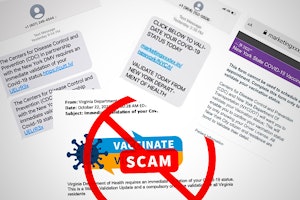
Received a Text/Email Asking You to Validate Your COVID-19 Status? It's a Scam
Scammers are impersonating government departments in an attempt to steal your information in this new COVID-19 scam.

Red Flags of Advance Fee Scams and How to Beat Them
A promise of a large sum of money in return for a fee should raise some red flags—more often than not, it's a scam.

Amazon Gift Card Scams: Stay Safe, Never Pay Via Gift Cards
If anyone asks for payment via Amazon gift cards, it's likely a scam, especially if it's someone claiming to be from a government agency.

Apple Gift Card Scam: Red Flags of Imposters After Your Money
Whether it's the IRS, Social Security office, or a relative, be careful with anyone asking for payment via an Apple gift card—it's likely a scam.

How Do You Beat Gift Card Scams? Never Pay Using Gift Cards
Beating this scam is simple—don't pay for anything using gift cards and don't give anyone you don't know or trust your gift card information.
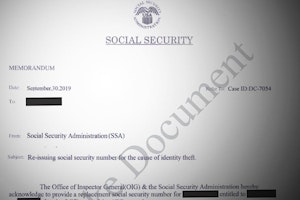
Social Security Scam Mail: Top Tips to Beat Scammers
If you receive a letter from the SSA or IRS, be sure to check for red flags of a scam before you send back any information—it could be a phishing attempt.

Tips to Beat Social Security Phishing Attempts by Scammers
When a government official contacts you, you tend to take it seriously. But beware, imposters are everywhere and trying to steal your information.
Guides Relating to Government Agencies

Permanent Daylight Savings Time: What Does It Mean For Us?
On March 15, 2022, a bill was passed by the Senate that would make daylight savings permanent should it be passed into legislation. Here's everything you need to know about the bill and what it means for us.

Spot & Avoid These 11 Common Facebook Messenger Scams
With every Facebook Messenger scam, the attacker is trying to steal from you—whether they’re after money, login credentials, or other personal information.

CIA Impersonators: How to Protect Yourself From CIA Imposters
CIA impersonators use a number of methods to trick victims, but with the right knowledge, you can avoid protect yourself from getting scammed.
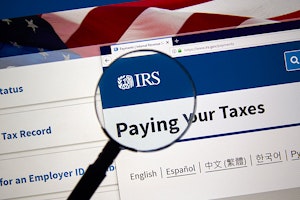
Dangers of Fake IRS Emails & Calls & How to Protect Yourself
Scammers pretend to be the IRS, tricking you into giving them your private information or money, but you can beat these scams if you know what to look for.
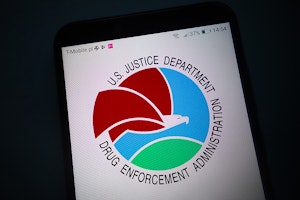
DEA Impersonators: How to Protect Yourself from "DEA" Phone Scams
If you get a call from a DEA agent requesting payment for a fine, hang up—this is a scam. Knowing the red flags and how these scams work can help keep your money safe.
News Relating to Government Agencies

Roe vs. Wade Overturned: Abortion Rights in Your State
Find out what the overturning of Roe vs. Wade means for abortion rights in your state.

Beware of this New Scam Involving A Fake Call from CBP
Sometimes it just safer not to pick up calls from unknown phone numbers.

Government Preps to Dismiss Lawsuit Against Fake University
After enrolling in a fake university set up by ICE, students who lost millions of dollars are to be disappointed by the U.S. government yet again.

Michigan Therapist Loses Life Savings in New Licensing Scam
Government authorities warn of a new scam targeting licensed professionals that has left others penniless.

Urgent CDC Warning: Eye Drops Linked to 3 Deaths, Loss of Vision
The CDC is warning eye drops users of a rare bacterial infection from 2 brands of eye drops. The infection is resistant to antibiotics and has resulted in the loss of vision, loss of eyeballs and the death of 3 patients.



